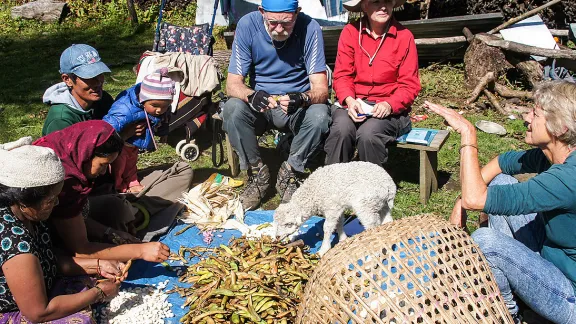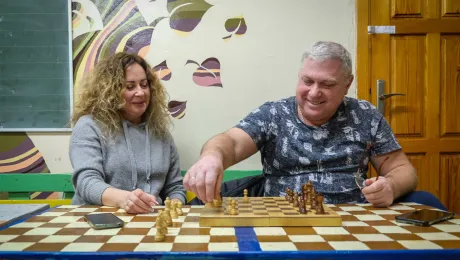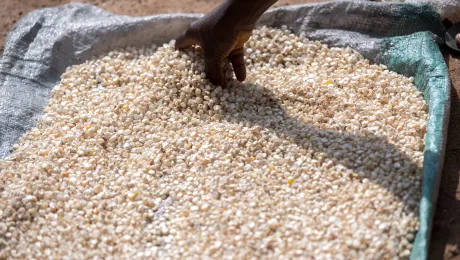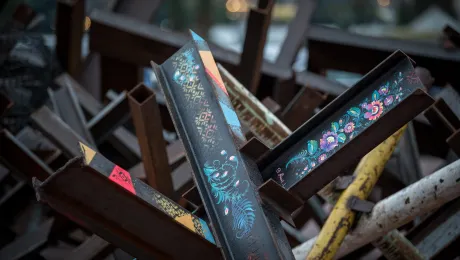
LWF Backstage Pass participants learn about the life of a Ghurka's family. Photo: LWF/ C. Kästner
We are sitting in a garden with a Magar family, shelling white beans. They will be dried or eventually go into some daal bhat. The fact that all our tour guides speak Nepali provides a great opportunity to just stop and find out more about the things people are doing.
The first family, while their life may have seemed simple to a group of people from the US, Australia and Europe, were quite wealthy in the local standard. The grandfather had been a Gurkha and served in the Indian army. The elite soldiers receive a life-long pension after service, so the family had goats and sheep. The men took care of the animals, while the mother and two daughters-in-law divided the housework. However we learned that one of the daughters by marriage had not seen her husband for three years – like many young men in the village, he works in Malaysia hoping to earn enough money to send home. Even the rich pension of a Gurkha apparently was not enough to sustain the family.
In a small village named Ghara, we met members of the Dalit community. LWF has been working with Dalit in Nepal, although not in this community, addressing especially the problem of bonded labor. It was also due to LWF advocacy in the liberation movement that bonded labor was eventually abolished.
But in remote communities like Ghara, the problem of debt and discrimination persists. The people we met were of the tailor caste, the second lowest of the Dalit. They were not allowed to enter the temple or higher caste’s houses. Almost none of the children had formal education. ”The discrimination is very strong, and it hurts”, a young man told us. The land they farm does not yield enough for the family. They are in debt and additional to making ends meet work hard to pay that debt.
Hearing these accounts of hard work, discrimination but also moments of pride – one family was very insistent that they had never done porter’s work for money – made us realize the role tradition plays in Nepali society – and the challenge to navigate these different contexts when doing development work in local communities.
That night we stayed in very traditional Nepali guest houses and were served a delicious daal bhat cooked on a clay stove with firewood. The two daughters, 14 and 13 years old, were preparing to go back to their boarding school, which they attend with the help of a scholarship. They had big dreams, both want to finish school and go to university. Pejina (14) plans to be a doctor, her younger sister wants to become an engineer.
It is hard to tell their chances. The family seemed proud of their daughters accomplishments, last but not least because they spoke the best English in the family. One of the uncles is the village doctor, Pejina hopes to learn from him. When we went to bed, we saw them do the dishes in the back yard at the light of a small candle.
When I asked one of the girls whether the cold outdoor shower is used all year round, I received a look of complete incomprehension. Then it seemed to dawn on her, and she broke into a big grin. “Of course” she said. That night, we happily traded a hot shower for some local insight, realizing that we were hosted by people who simply did not have that choice.
In the morning, we were woken by smoke: The mother had fired up the stove to bake chapatti bread for breakfast, and the smoke went from the tin roof of the kitchen directly into the guest rooms. It was something none of us will forget easily – as we wont forget the feeling of brushing your teeth watching the sun rise over the Annapurna.
Related Blog Posts



